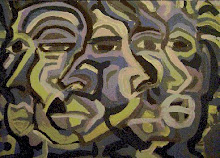With the ever expanding list of economic, political and social problems, it's easy for one to become overwhelmed. Many people gripe about change, some even have a political campaign based upon it. Many bloggers are critics of others, many bloggers are supporters of critics. Many bloggers question the prevailing views - yet, there are few sites which actually have answers to questions regarding positive change.
My question is; "What Do We Do?".
Theodore Roosevelt stated;
"It's not the critic who counts. Not the man who points out where the strong man stumbled or where the doer of great deeds could have done them better. The credit goes to the man (or woman) who is actually in the arena. Whose face is marred by dust and sweat and blood. Who strives valiantly, who errs and comes up short again and again. And who, while daring greatly, spends himself in a worthwhile cause so that his place may not be among those cold and tired souls who knew neither victory nor defeat"
James 1:22 (KJV) puts it this way;
"But be ye doers of the word, and not hearers only, deceiving your own selves".
I started this blog as a sort of debriefing for the past ten years of trying to help many people out of dire situations - whether self-inflicted or institutional. Over the past decade, my ideas of morality, justice and fairness have been reshaped and in many cases changed altogether. I've failed more times than I've succeeded and have become jaded in the process. Women's issues are important but so are environmental, children's, GLBT, animal rights, economic and a list of others. My situation dictated that I would best serve in the arena of helping those who were victims of racial (both perceived and real) problems. My opinions are mainly based on empirical knowledge and not on the many ineffective studies or theories which abound.
One day, I was giving a lady a ride. It was raining cats and dogs this day. While on our way to her destination, I spotted a car stuck in the road. Instinctively, I pulled into a parking lot and ran to the stuck car to lend a push. Upon returning to my car, the woman (whom I was helping by giving her a ride) became upset with me for leaving her in a dark parking lot. WTF? How can someone that is getting help be mad at someone for helping someone else? As my girl Lydia would say; "My people...my people..." . I couldn't even reply to her anger, I was dumbfounded.
I thought; "Why am I helping these people?" and "How much am I supposed to do for these people?". I thought that all of my grandmothers' Bible teachings must have been in error. St. Mark (KJV) states; "...If any man desire to be first, the same shall be last of all, and servant to all". Were my aspirations of a Heavenly reward at fault? Were my beliefs that if I took care of God's children that God would in turn take care of me wrong?
How much was I obligated to do? Luke 21:4 (KJV) states: "For all these of their abundance cast in unto the offerings of God but she (the poor woman) of her penury hath cast in all of the living that she has". Was I supposed to give all until I had nothing left? Did the widow cast in that one time or sometimes or every time? How could I know what God's intentions were for me?
The rules of the Bible were becoming too hard. They'd become an unwanted burden. Matthew 22: 37-40 (KJV) states; "...Thou shalt love the Lord thy God with all thy heart, and with all thy soul, and with all thy mind.
This is the first and great commandment.
And the second is like unto it, thou shalt love thy neighbor as thyself.
On these commandments hang the law of the prophets".
Now, ten commandments might be tough, but I could do two.
By this time , I had been lied upon, stolen from and taken advantage of - all by tenants in my homes who I was trying to help. The people that the Black people (I live in the least integrated neighborhood in my town. There is one Asian woman in the whole of my sub-division) in my neighborhood thought that they were too good for or were afraid of were the people I was trying to help. My neighbors would warn me to stay away from "those people".
My faith in my childhood teachings had become feeble at best. A man in Mark (KJV) says; "...Lord, I believe: help thou mine unbelief". Mother Theresa is reported to have gone through the same crisis of faith.
My value to my people [In stating my people, I mean ALL people in general but Blacks in particular] has often been called into question by my people themselves. Many would tell me that by changing their values that they would lose the "essence" of their blackness. Huh? I often heard the older folks stating that a Black man could never have anything good because the White man would always take it from them. I had to remember that this was the South. Many people over fifty had grown up with the conditions of Segregation first hand. The high schools in this town weren't fully integrated until 1983! The problem was that these people were passing those old ideals on to younger generations. The younger generations were buying into the mind-set. I was in an uphill battle against those whose side I was on. Again from Mark (KJV) "...A prophet is not without honor, save in his own country, and in his own house". I had a Muslim-Imam tell me that my goodness was from my White ancestors and that the idea of integrity was foreign to Blacks. It is needless to say that I had little interest in converting. I pointed out a text in an Islamic writing that stated that God loves all righteousness. I never thought that race was an issue when choosing one's friends or allies. I prefer to go by one's deeds not their genes.
Many people would complain about their conditions as being inescapable. Gandhi states; "As human beings, our greatness lives not so much in being able to remake the world - that is the myth of the 'Atomic-Age' - as in being able to remake ourselves". This idea sounds more like the philosophies of the Nation of Islam, The Black Panther Party, Marcus Garvey and a litany of others (Bill Cosby, Barak Obama included) to preach a message of self-determination. Viktor Frankel writing about the Jewish determination to retain their humanity in the worst situation wrote; "We who lived in concentration camps can remember the men who walked through the huts comforting others, giving away their last piece of bread. They may have been few in numbers, but they offer sufficient proof that everything can be taken from a man but the one thing, the last of the human freedoms to (determine one's) attitude... to choose one's own way".
I believe that many poor and destitute people have given up. Many have chosen to accept their fate and be condemned to the repercussions of that grievous life. Is hope lost?
These ideas of making a bad situation into a good one have cost me much. The rewards are few. The task too difficult. My hope is lost. I now strive to better others by rote. I have little or no feelings in regards to these people. I'm just on auto-pilot. Maybe those teachings from my grandmothers stuck and I can't escape my inherent desire to help.
Author, Mariam Wright Edelman states; "I also learned that critical civil and political rights would not mean much to a hungry, homeless, illiterate child and family if they lacked the social and economic means to exercise them". Rev. Martin Luther King Jr. writes; "Justice is indivisible. It must also be said that it would be rather absurd to work passionately and unrelentingly for integrated schools and not be concerned about the survival of a world in which to be integrated". It seems that acting to help people institutionally does little good without the people making an active effort to help themselves (and vise-versa).
When I used to wait tables at T.G.I. Friday's, Gonzo (a cook) would call me the "King of Lazy". It's not that I didn't work hard. It just made sense to me that if my co-workers were more skilled and better at their jobs - I wouldn't have to work as hard or as often. The easiest fix was to help everyone around me to be better. This theory could apply to society as a whole.
Where do we start?
What do we do?
Thursday, August 14, 2008
Subscribe to:
Post Comments (Atom)














2 comments:
Here's what you can do, start by:
1. ceasing all that bible banging with reliance upon and references to bible passages - it does not seem logical that you would place your faith and beliefs in the religion of your former captors;
2. stop watching cable news;
3. stop reading internet blogs;
4. have the lowest of expectations when dealing with adults - most people are fucked-up main. It's sad, but that's just how it is. You know that oft cited adage "no good deed goes unpunished". I know you don't want to believe this, but it is true;
5. if you must help someone, help kids. Most likely they will grow up to be fucked-up adults too, but at least there's a small chance something benevolent that you do will influence them;
6. handle your OWN business. Be fair and reasonable with others, but don't go out of your way to help them with the expectation that they will be grateful;
7. the best possible way to help others is to be an example and share knowledge when the recipient is receptive. Basically do your own thing and if people want to get some, let them;
8. don't do business with black people - I know, but I have been screwed more times by black folks than anybody else....I'm just saying.
I do really feel you on this post. These suggestions I've listed are born of my own cynicism, frustration, despair and real world experience. I find that keeping company with other like-minded people helps, either by giving you strength and energy to continue doing the things you believe are right, or by serving as your own comforting universe, where people share certain beliefs and values, can attract other similar folks, and can influence others through its interactions.
Hope IS lost, but there really is no other choice but to keep going until you don't want to do that anymore either.
It's a difficult one. You help but it gets thrown back at you so many times. Back in Africa we have a word to express our role and identity - Ubuntu. I am because of my community (rough translation of meaning). Sometimes we sit and ask ourselves, why are we doing this? Why - when so many people throw it back at us. I can't speak for others, but I do it because it is who I am. Like breathing. Like when you stopped the car to help the person with theit car. We don't think why we breathe, we just do. Sometimes it will be thrown back in our faces. But fr me those people are not my people. They might look like my people and talk like my people, but they dishonor my people and their way of life. I also do it for the "Rule of 1". (Made it up.) But it goes like this. If I have to go through 99 bad experiences of getting ripped off and exploited before I get to "The 1" who will pass it forward and live Ubuntu and appreciate, then it was all worthwhile.
You have Ubuntu. Hold on to it. It's easy to lose. And you can't get it back.
Post a Comment